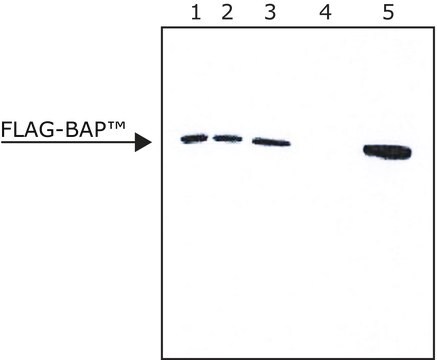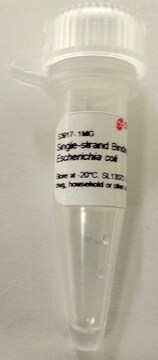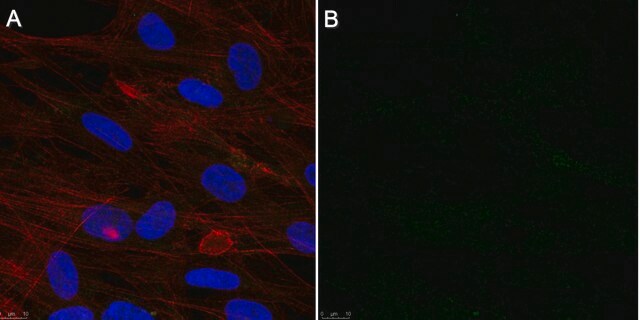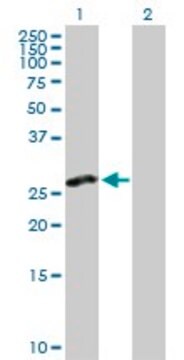추천 제품
생물학적 소스
mouse
Quality Level
결합
unconjugated
항체 형태
purified antibody
항체 생산 유형
primary antibodies
클론
MAB13 (also referenced as E1), monoclonal
분자량
calculated mol wt 56.43 kDa
정제법
using protein G
종 반응성
human, mouse
포장
antibody small pack of 100 μg
기술
ELISA: suitable
flow cytometry: suitable
immunocytochemistry: suitable
immunofluorescence: suitable
western blot: suitable
동형
IgG1κ
에피토프 서열
C-terminal
단백질 ID 수납 번호
UniProt 수납 번호
배송 상태
ambient
타겟 번역 후 변형
unmodified
유전자 정보
human ... EBNA1(3783774)
일반 설명
Epstein-Barr nuclear antigen 1 (UniProt: P03211; also known as EBNA-1, EBV nuclear antigen 1) is encoded by the EBNA1 (also known as BKRF1) gene (Gene ID: 3783709) in Epstein-Barr virus (EBV). EBV is a gamma-herpesvirus, a causative agent of infectious mononucleosis. Although the majority of virus infected individuals remain healthy, EBV has been implicated in the pathogenesis of African Burkitt s lymphoma and nasopharyngeal carcinoma. EBNA1, a multi-functional protein, plays an important role in maintaining EBV in the host cell and has been implicated in host cell immortalization. It plays an essential role in replication and partitioning of viral genomic DNA during latent viral infection. During this phase, the circular double-stranded viral DNA undergoes replication once per cell cycle and is efficiently partitioned to the daughter cells. EBNA1 activates the initiation of viral DNA replication through binding to specific sites in the viral latent origin of replication, oriP. It is also reported to direct the segregation of viral episomes by mediating their attachment to host cell metaphase chromosomes and is known to activate the transcription of several viral latency genes. By counteracting the stabilization of host p53, it also reduces apoptosis and increases host cell survival. EBNA1 is also a risk factor in a variety of malignancies and is the only viral protein found in all EBV-related malignancies. Its C-terminal region contains a dimerization domain and a DNA binding domain (aa 459-607). Although this domain is essential for its replication function of EBNA1, it is not sufficient for this activity and the N-terminal half of EBNA1 is also required.
특이성
Clone MAB13 (E1) is a mouse monoclonal antibody that detects EBNA1. It targets an epitope within 9 amino acids from the C-terminal region.
면역원
Membrane free HLA-A201 with EBV (strain B95-8) EBNA1 (FMVFLQTHI) 562-570 recombinant protein.
애플리케이션
Quality Control Testing
Evaluated by Flow Cytometry in T2 cells pulsed with EBNA1 peptide (562-570).
Flow Cytometry Analysis (FC): 1 μg of this antibody detected HLA-A2-EBV EBNA1 in one million T2 cells pulsed with EBNA1 peptide (562-570).
Tested Applications
Immunofluorescence Analysis: A representative lot detected HLA-A02:01 EBV-EBNA1 in Immunofluorescence applications (Lai, J., et al. (2016). Blood. 128(10):1396-407; Sim, A.C.N., et al. (2013). Sci Rep. 3:3232).
Immunohistochemistry Applications: A representative lot detected HLA-A02:01 EBV-EBNA1 in Immunohistochemistry applications (Sim, A.C.N., et al. (2013). Sci Rep. 3:3232).
Western Blotting Analysis: A representative lot detected HLA-A02:01 EBV-EBNA1 in Western Blotting applications (Sim, A.C.N., et al. (2013). Sci Rep. 3:3232).
Flow Cytometry Analysis: A representative lot detected HLA-A02:01 EBV-EBNA1 in Flow Cytometry applications (Lai, J., et al. (2016). Blood. 128(10):1396-407; Lai, J., et al. (2017). Sci Rep. 7(1):9923).
Immunocytochemistry Analysis: A representative lot detected HLA-A02:01 EBV-EBNA1 in Immunocytochemistry applications (Lai, J., et al. (2016). Blood. 128(10):1396-407; Lai, J., et al. (2017). Sci Rep. 7(1):9923).
Surface plasmon resonance: A representative lot detected HLA-A02:01 EBV-EBNA1 in Surface plasmon resonance applications (Sim, A.C.N., et al. (2013). Sci Rep. 3:3232).
ELISA Analysis: A representative lot detected HLA-A02:01 EBV-EBNA1 in ELISA applications (Lai, J., et al. (2016). Blood. 128(10):1396-407; Lai, J., et al. (2017). Sci Rep. 7(1):9923).
Note: Actual optimal working dilutions must be determined by end user as specimens, and experimental conditions may vary with the end user
Evaluated by Flow Cytometry in T2 cells pulsed with EBNA1 peptide (562-570).
Flow Cytometry Analysis (FC): 1 μg of this antibody detected HLA-A2-EBV EBNA1 in one million T2 cells pulsed with EBNA1 peptide (562-570).
Tested Applications
Immunofluorescence Analysis: A representative lot detected HLA-A02:01 EBV-EBNA1 in Immunofluorescence applications (Lai, J., et al. (2016). Blood. 128(10):1396-407; Sim, A.C.N., et al. (2013). Sci Rep. 3:3232).
Immunohistochemistry Applications: A representative lot detected HLA-A02:01 EBV-EBNA1 in Immunohistochemistry applications (Sim, A.C.N., et al. (2013). Sci Rep. 3:3232).
Western Blotting Analysis: A representative lot detected HLA-A02:01 EBV-EBNA1 in Western Blotting applications (Sim, A.C.N., et al. (2013). Sci Rep. 3:3232).
Flow Cytometry Analysis: A representative lot detected HLA-A02:01 EBV-EBNA1 in Flow Cytometry applications (Lai, J., et al. (2016). Blood. 128(10):1396-407; Lai, J., et al. (2017). Sci Rep. 7(1):9923).
Immunocytochemistry Analysis: A representative lot detected HLA-A02:01 EBV-EBNA1 in Immunocytochemistry applications (Lai, J., et al. (2016). Blood. 128(10):1396-407; Lai, J., et al. (2017). Sci Rep. 7(1):9923).
Surface plasmon resonance: A representative lot detected HLA-A02:01 EBV-EBNA1 in Surface plasmon resonance applications (Sim, A.C.N., et al. (2013). Sci Rep. 3:3232).
ELISA Analysis: A representative lot detected HLA-A02:01 EBV-EBNA1 in ELISA applications (Lai, J., et al. (2016). Blood. 128(10):1396-407; Lai, J., et al. (2017). Sci Rep. 7(1):9923).
Note: Actual optimal working dilutions must be determined by end user as specimens, and experimental conditions may vary with the end user
Anti-HLA-A02:01 EBV-EBNA1, clone MAB13, Cat. No. MABF2323, is a mouse monoclonal antibody that detects EBNA1 and is used in ELISA, Flow Cytometry, Immunocytochemistry, Immunofluorescence, Immunohistochemistry, Surface Plasmon Resonance & Western Blotting.
물리적 형태
Purified mouse monoclonal antibody IgG1 in buffer containing 0.1 M Tris-Glycine (pH 7.4), 150 mM NaCl with 0.05% sodium azide.
저장 및 안정성
Recommended storage: +2°C to +8°C.
기타 정보
Concentration: Please refer to the Certificate of Analysis for the lot-specific concentration.
면책조항
Unless otherwise stated in our catalog or other company documentation accompanying the product(s), our products are intended for research use only and are not to be used for any other purpose, which includes but is not limited to, unauthorized commercial uses, in vitro diagnostic uses, ex vivo or in vivo therapeutic uses or any type of consumption or application to humans or animals.
적합한 제품을 찾을 수 없으신가요?
당사의 제품 선택기 도구.을(를) 시도해 보세요.
Storage Class Code
12 - Non Combustible Liquids
WGK
WGK 1
Flash Point (°F)
Not applicable
Flash Point (°C)
Not applicable
시험 성적서(COA)
제품의 로트/배치 번호를 입력하여 시험 성적서(COA)을 검색하십시오. 로트 및 배치 번호는 제품 라벨에 있는 ‘로트’ 또는 ‘배치’라는 용어 뒤에서 찾을 수 있습니다.
자사의 과학자팀은 생명 과학, 재료 과학, 화학 합성, 크로마토그래피, 분석 및 기타 많은 영역을 포함한 모든 과학 분야에 경험이 있습니다..
고객지원팀으로 연락바랍니다.







